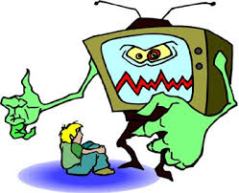Television nowadays appears to be a stress buster for us but then as studies shows, it actually adds to your mental stress. Television may seem to help us get rid of our tensions but it adds burden to our brain according to studies. Yes, television has its negative effects and has sever negative impact on the minds of the watchers.
Spending too much time watching television consumes our time than can rather be spent in other fruitful and healthy activities like exercising or reading. It also uses up our time that can be spent with our family and friends. Spending time with our loved ones is a better expenditure of time than in watching TV.
Children today watch television for long hours. They spend their evenings watching their favourite program on TV, at times they stay up late to watch films. This activity adds to their sedentary hours. Addiction to television deprives them of their time to play. They should be playing outdoors with their friends, engage in physical activities and read books rather than spending their time watching television.
According to researchers, attention deficit disorders in children are a result of watching television for long everyday. They say that watching television leads to developmental disorders, affecting that faculty of the brain which is responsible for their language skills. Children who watch more television and read less, show difficulties in paying attention or concentrating.
Nowadays, television is one of the affective media used to promote all kinds of products. Unsupervised television watching in children can lead to early exposure to things that they may not understand or may misinterpret. Television advertisements my influence the children to resort to improper measures. Commercials about fast foods, junk foods, softdrinks and others that are not good for the health are bound to leave an impact on children by watching them. Advertisements, films and programs leaves impact and influences young minds by thoughts and behaviour.
Television is one means of recreation but its excessive use is detrimental to one’s physical and mental health. We need to strike a balance of everything in life.
Television nowadays appears to be a stress buster for us but then as studies shows, it actually adds to your mental stress. Television may seem to help us get rid of our tensions but it adds burden to our brain according to studies. Yes, television has its negative effects and has sever negative impact on the minds of the watchers.
Spending too much time watching television consumes our time than can rather be spent in other fruitful and healthy activities like exercising or reading. It also uses up our time that can be spent with other things.
Children today watch television for long hours. They spend their evenings watching their favourite program on TV, at times they stay up late to watch films. This activity adds to their sedentary hours. Addiction to television deprives them of their time to play. They should be playing outdoors with their friends, engage in physical activities and read books rather than spending their time watching television.
According to researchers, attention deficit disorders in children are a result of watching television for long everyday. They say that watching television leads to developmental disorders, affecting that faculty of the brain which is responsible for their language skills. Children who watch more television and read less, show difficulties in paying attention or concentrating.
Nowadays, television is one of the affective media used to promote all kinds of products. Unsupervised television watching in children can lead to early exposure to things that they may not understand or may misinterpret. Television advertisements my influence the children to resort to improper measures. Commercials about fast foods, junk foods, softdrinks and others that are not good for the health are bound to leave an impact on children by watching them. Advertisements, films and programs leaves impact and influences young minds by thoughts and behaviour.
Television is one means of recreation but its excessive use is detrimental to one’s physical and mental health. We need to strike a balance of everything in life.

